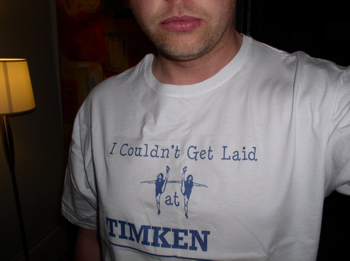Ok, so late last night, at about 1:30, I got my questions off to James Howard Kunstler, the author of the book “The Long Emergency.” In retrospect, I guess I should have worked a bit harder on them, but I was tired. Anyway, here are my questions and Mr. Kunstler’s responses…. I don’t want to give anything away, but if you make it to the very end, there’s a little surprise.
MM: Would it be safe to say that you consider suburbia is the most significant strategic miscalculation in American history?
JHK: I have referred to it as the greatest misallocation of resources in the history of the world — which is perhaps a little different. I say that because it was an infrastructure for daily living with no future. Having poured our national wealth into it, and damaged the terrain of America so badly, we are now stuck with enormous liabilities.
MM: Recently a sustainability group came out with their list of the ten areas in the U.S. most likely to survive in an era of oil scarcity. They claimed that New York City was the best positioned, given the current mass-transit infrastructure, etc. Having just read “The Long Emergency,” however, the first thing to cross my mind was, “But what will these people be eating?” Given the fact that the populations within cities like New York have grown considerably while proximate farmland has all but disappeared, is it safe to say that you don’t think NYC is the best place to find yourself when the long emergency comes?
JHK: There has been more than one article touting the sustainability of New York City — including a famous one in the New Yorker magazine a year or so ago. They are incorrect in my opinion. They lacked dimensional thinking. As I recall, the New Yorker article argued that NYC was the “greenest” city because you could stack so many inhabitants in tall buildings that occupied a modest footprint of land. This is a very limited way of understand our predicament. I maintain that cities overburdened with mega-structures and skyscrapers will suffer. And I regard a skyscraper as anything over seven stories high. I agree with you that proximity to viable agriculture is a matter of surpassing importance in the years ahead, and I said rather explicitly in my book, “The Long Emergency,” that the overgrown urban organism of New York would suffer from the suburban destruction of its formerly rural hinterlands. Anyway, I’m convinced that all our mega-cities will contract severely — possibly while densifying at their cores ands along their waterfronts. I predict we’ll see an emphatic reversal of the 200-year-old trend of people moving from the rural places and small towns to the big cities.
MM: If you don’t mind my asking, where do you plan to be as we enter this period of converging catastrophes? What factors entered into your decision?
JHK: Somewhere in the immediate vicinity of Saratoga Springs, NY, where I’ve been for exactly thirty years.
MM: It seems, from what I’ve read of your work, that you feel as though areas of the upper Midwest, relatively speaking, may come through it OK. Commenting on these areas in Rolling Stone, you say, “I regard them as less likely to fall into lawlessness, anarchy or despotism and more likely to salvage the bits and pieces of our best social traditions and keep them in operation at some level.” As someone who moved to a small town in Michigan for this very reason, I’m wondering what makes you think that we’ll be able to protect ourselves from what’s going on around us. How, in other words, can any region avoid anarchy, when the regions surrounding it are boiling over?
JHK: I don’t think any part of the nation will be immune to social disorder, but I do think the center may hold somewhat better north of the Mason-Dixon line and East of the Mississippi. I think the social contract has a better chance of remaining at least partly in force — more so than, say, Alabama, where the romance of firearms combines with notions of hyper-individualism to produce a pretty scary ethos.
MM: Word is that Al Gore may be preparing for another run at the presidency. Given the fact that he seems to be the politician most dedicated to the issues which you’re discussing, is that something you’d support? What advice would you give him if he asked for your thoughts on how to win, and how to get Americans to make the sacrifices necessary to make substantial change?
JHK: Well, Gore finked out on the New Urbanists in 2000 and instead pandered to the homebuilding industry and their customers. But I might forgive him that performance. I do believe he correctly senses the trouble we’re in. But the Democratic party itself is in terrible trouble, intellectually and in every other way. They’ve got to drop their silly-ass preoccupations with things like gender confusion and get on with some serious things, like a comprehensive effort to restore the US railroad system.
MM: Is there anything that can be done, in your opinion, to lessen the impact of what you’re calling “the long emergency” – the converging catastrophes that await us when cheap oil is no longer easy to come by? Putting global warming aside, isn’t it conceivable that we could, through conservation, a renewed dedication to mass-transit, and the implementation of significant gas taxes (with proceeds going toward sustainable alternatives), avoid some of the terrible things you’re predicting in the book?
JHK: Yeah, plenty. Get started pronto on the railroads. Get our harbors outfitted for boats instead of just parks and picnics, because we’re going to need these things for moving stuff if we are going to continue to have commerce. Young people can chose carefully where they are going to live (I support small towns and small cities, unless you want to be a farmer.) Many people may find they are interested in agriculture. That will be very important line of work in the years ahead as industrial agriculture flops. Another important field will be small-scale, hands-on engineering — repairing small hydro installations and the equipment in them, etc.
MM: I can appreciate your pessimism, and, generally speaking, I share it, but do you think that yours is a message that will motivate people to change their behaviors? Are you so convinced that efforts to stop what is coming will be futile that you don’t feel as though we should even try? Might it not be better to offer a chance for success, rally people together, and go out swinging?
JHK: I resent the hell out of being labeled a “pessimist.” In my writings, I offer a comprehensive view of how we can respond intelligently to these new circumstances. That’s neither pessimistic nor cynical. So fuck you.
OK, maybe I wasn’t clear. Maybe he got the impression that I was saying that his vision of the future is unnecessarily pessimistic. (I happen to find his scenario more likely than any of the others I’ve heard over the past few years, and I do not think that he’s hyperbolizing.) What I was trying to say is that, if the objective is to get people to change their ways, might there not be a way to present the material in such a way that it presents at least the glimmer of hope. And, I wasn’t suggesting that his book should have been written any differently. When I asked the question, I was thinking more about the 2008 election and the fact (and yes, I said “fact”) that Al Gore will not be elected if he runs on a platform of fear, regardless of how justified that fear is.
So, another person I respect has told me to fuck myself. (How many times do I have to hear that before it begins to sink in?) I personally think that it was a bit uncalled for this time, but I guess that’s his right… Judging from his writing, though, I was expecting that he might, if he felt so strongly about what I’d asked, come back with something a little less confrontational. After all, he’s the guy that when recently asked what advice he would give to parents raising children who would be growing up during the long emergency, before anything else, said, “Teach them how to be polite.”
In Kunstler’s defense, he did soften up a bit in his next email to me. After thanking him for answering my questions, and then mentioning that I was off to “fuck myself,” he responded that I should, “At least be gentle with (myself).” That, I thought, was quite polite.
In spite of everything, I do highly recommend his book, “The Long Emergency: Surviving the Converging Catastrophes of the Twenty-First Century.” (A somewhat adapted excerpt can be found at Rolling Stone dotcom.) And, if you’re in the area, come out and hear him speak at Shaman Drum tomorrow night at 7:00… Just don’t say the “P” word.

 Thanks to bOb, I now have my very own “I Couldn’t Get Laid at Timken High” t-shirt… For those of you who don’t remember, Timken High is the public school in Ohio where
Thanks to bOb, I now have my very own “I Couldn’t Get Laid at Timken High” t-shirt… For those of you who don’t remember, Timken High is the public school in Ohio where 









